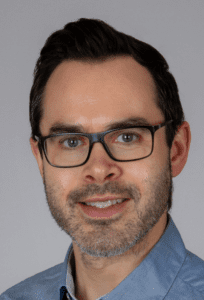Posted By: Sarah Ratzel, PhD, Science Editor, AJHG

Each month, the editors of The American Journal of Human Genetics interview an author of a recently published paper. This month, we check in with Adam de Smith to discuss his paper, “Genetic determinants of blood-cell traits influence susceptibility to childhood acute lymphoblastic leukemia”.
AJHG: What caused you to start working on this project?
AdS: My research is focused on understanding the causes of childhood leukemia, in particular acute lymphoblastic leukemia (ALL), which is a malignancy of lymphocytes and the most common childhood cancer. Despite high cure rates, survivors of childhood ALL face long-term treatment-related disorders that impact their quality of life. The ultimate goal is to prevent childhood ALL, but first we need a better understanding of the etiology of the disease. In terms of this project specifically, we had noticed that in genome-wide association studies (GWAS) of ALL, there were several ALL-associated risk loci that had also been reported to be associated with variation in blood cell traits. I had the idea to investigate the causal role of variation in blood cell traits in childhood ALL using Mendelian randomization (MR), initially thinking to use data from already published GWAS of blood cell traits to develop instruments for MR. Then, at an ASHG conference about three years ago, I was chatting with a former colleague at UCSF, Dr. Linda Kachuri, and learned that she just so happened to be running a GWAS of blood cell traits using UK Biobank data and was interested in developing instruments for MR studies. So we decided to collaborate on this project, and that conversation at ASHG led to our manuscript that was recently published in AJHG.
AJHG: What about this paper most excites you?
AdS: The core finding of our paper – that a genetic predisposition to overproducing lymphocytes, overall and in relation to other blood cell types, is associated with an increased risk of childhood ALL – is what excites me the most. Firstly, as this was the main hypothesis of our study, and second because it makes biological sense that being predisposed to producing more lymphocytes would increase the risk of ALL. What also excites me is thinking about how to build upon these findings in future studies to understand the potential mechanisms involved.
AJHG: Thinking about the bigger picture, what implications do you see from this work for the larger human genetics community?
AdS: In our study, the GWAS analysis of blood cell traits using UK Biobank data was carried out specifically with the development of instruments for Mendelian randomization in mind (for example, we excluded individuals with prior cancer diagnoses or with immune diseases that may confound the results). This provides a framework for future MR studies investigating the role of blood cell trait variation in other cancer types, in particular for other hematological malignancies. We also hope that our work inspires additional MR studies in childhood ALL to reveal further insights into the etiology of this disease.
AJHG: What advice do you have for trainees/young scientists?
AdS: First of all, to find a research area that you are passionate about, which I think becomes more and more important as your academic career progresses – no one wants to write an IRB protocol unless they really want to do the research.
Academics are not always the best or most proactive at handing out positive feedback regularly, so don’t be afraid to ask others how you are doing. If you are not receiving enough feedback from your mentors then perhaps try to seek it from your peers!
It’s a cliché that life is short, but try not to dwell too long on paper/grant rejections, and don’t be afraid to network and reach out to others in the field, even if much more senior, to discuss your work and potential collaborations.
AJHG. And for fun, tell us something about your life outside of the lab.
AdS: Outside of the lab/office, I love spending time with family and friends exploring Los Angeles – there seem to be endless places to hike, and to eat great food. But one of my favorite pastimes pre-pandemic was going to karaoke. I love music and singing, but that is definitely the closest I will ever get to being on stage, outside of conferences anyway!
Adam de Smith, PhD is an Assistant Professor at the Center for Genetic Epidemiology in the Department of Population and Public Health Sciences at Keck School of Medicine University of Southern California.
